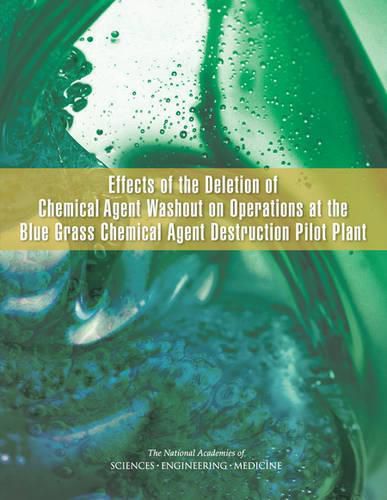Readings Newsletter
Become a Readings Member to make your shopping experience even easier.
Sign in or sign up for free!
You’re not far away from qualifying for FREE standard shipping within Australia
You’ve qualified for FREE standard shipping within Australia
The cart is loading…






The United States manufactured significant quantities of chemical weapons during the Cold War and the years prior. Because the chemical weapons are aging, storage constitutes an ongoing risk to the facility workforces and to the communities nearby. In addition, the Chemical Weapons Convention treaty stipulates that the chemical weapons be destroyed. The United States has destroyed approximately 90 percent of the chemical weapons stockpile located at seven sites.
As part of the effort to destroy its remaining stockpile, the Department of Defense is building the Blue Grass Chemical Agent Destruction Pilot Plant (BGCAPP) on the Blue Grass Army Depot (BGAD), near Richmond, Kentucky. The stockpile stored at BGAD consists of rockets and projectiles containing the nerve agents GB and VX and the blister agent mustard. Continued storage poses a risk to the BGAD workforce and the surrounding community because these munitions are several decades old and are developing leaks.
Due to public opposition to the use of incineration to destroy the BGAD stockpile, Congress mandated that non- incineration technologies be identified for use at BGCAPP. As a result, the original BGCAPP design called for munitions to be drained of agent and then for the munition bodies to be washed out using high-pressure hot water. However as part of a larger package of modifications called Engineering Change Proposal 87 (ECP-87), the munition washout step was eliminated. Effects of the Deletion of Chemical Agent Washout on Operations at the Blue Grass Chemical Agent Destruction Pilot Plant examines the impacts of this design change on operations at BGCAPP and makes recommendations to guide future decision making.
$9.00 standard shipping within Australia
FREE standard shipping within Australia for orders over $100.00
Express & International shipping calculated at checkout
The United States manufactured significant quantities of chemical weapons during the Cold War and the years prior. Because the chemical weapons are aging, storage constitutes an ongoing risk to the facility workforces and to the communities nearby. In addition, the Chemical Weapons Convention treaty stipulates that the chemical weapons be destroyed. The United States has destroyed approximately 90 percent of the chemical weapons stockpile located at seven sites.
As part of the effort to destroy its remaining stockpile, the Department of Defense is building the Blue Grass Chemical Agent Destruction Pilot Plant (BGCAPP) on the Blue Grass Army Depot (BGAD), near Richmond, Kentucky. The stockpile stored at BGAD consists of rockets and projectiles containing the nerve agents GB and VX and the blister agent mustard. Continued storage poses a risk to the BGAD workforce and the surrounding community because these munitions are several decades old and are developing leaks.
Due to public opposition to the use of incineration to destroy the BGAD stockpile, Congress mandated that non- incineration technologies be identified for use at BGCAPP. As a result, the original BGCAPP design called for munitions to be drained of agent and then for the munition bodies to be washed out using high-pressure hot water. However as part of a larger package of modifications called Engineering Change Proposal 87 (ECP-87), the munition washout step was eliminated. Effects of the Deletion of Chemical Agent Washout on Operations at the Blue Grass Chemical Agent Destruction Pilot Plant examines the impacts of this design change on operations at BGCAPP and makes recommendations to guide future decision making.